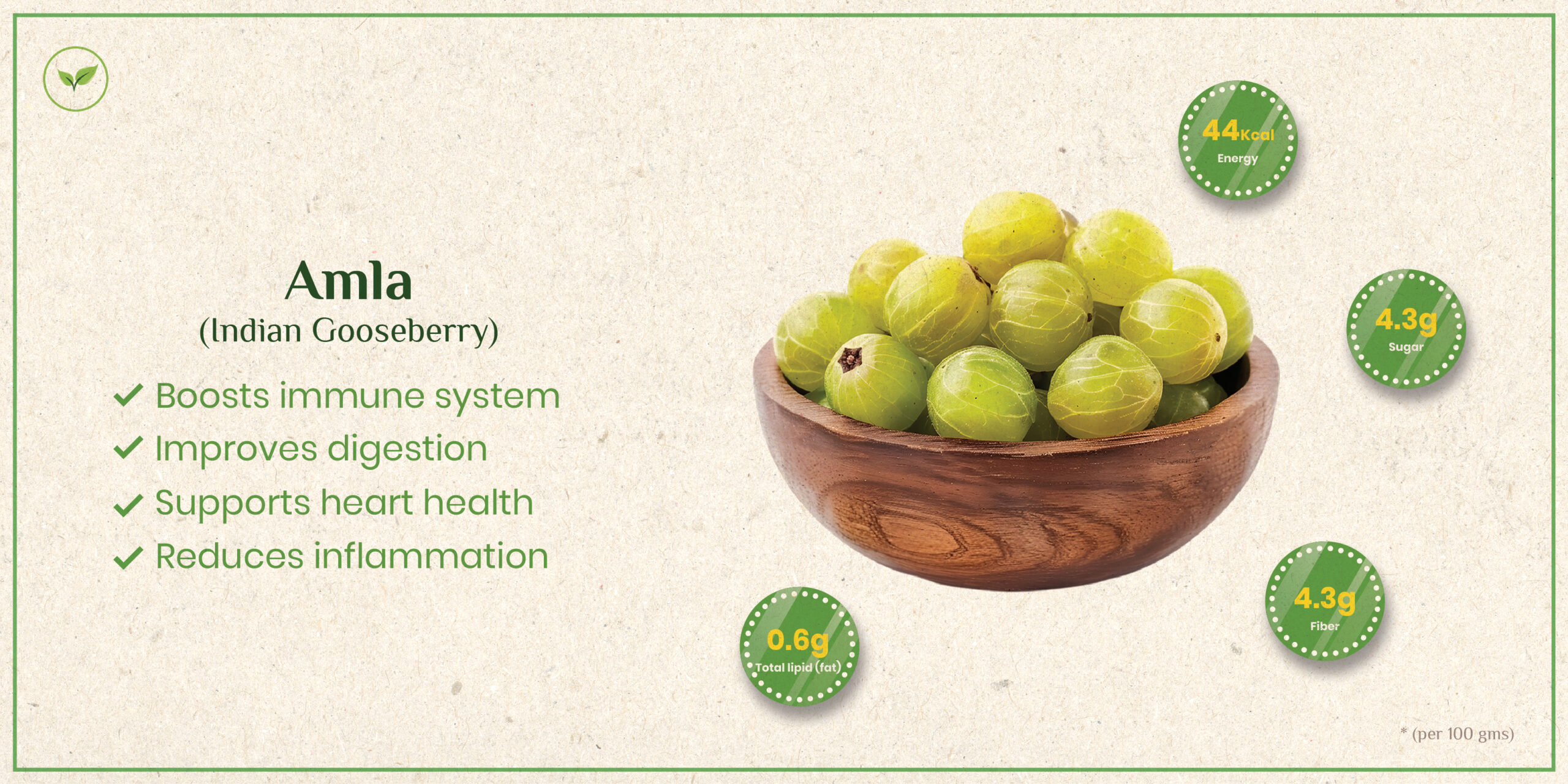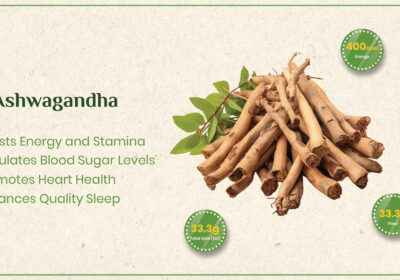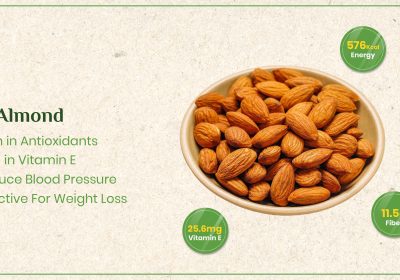
Amla, or Indian gooseberry, is hailed as a powerful superfruit with a wealth of benefits. Renowned for its striking green hue and distinctive tangy flavour, this fruit holds a special place in Ayurveda. Its unique taste and adaptability make it a favourite among those seeking to enrich their diets with natural goodness.
Rich in Vitamin C, Amla is an essential of many Ayurvedic remedies, praised for its ability to rejuvenate the body and balance all three doshas- Vata, Pitta, and Kapha. The antioxidants in this tiny fruit make it an excellent choice for boosting immunity and promoting longevity. All in all, it has the potential to transform not just your meals but your overall health journey.
Curious how Amla can support your overall well-being? Discover its amazing benefits.
8 Common Health Benefits of Amla
Let’s explore eight key ways Amla can support your health and wellness.
1. Boosts Immunity
As we discussed earlier, Amla is one of the richest sources of Vitamin C, which plays a vital role in strengthening your immune system. It helps your body fight off infections, colds, and viruses more effectively. If you’re looking for a natural way to stay healthier, Amla is your go-to immune booster!
2. Aids Digestion
If you’ve been struggling with digestive issues like bloating or constipation, Amla can work wonders. It helps stimulate the production of digestive enzymes, ensuring smoother digestion. Plus, it detoxifies the digestive tract, making you feel lighter and more energetic after meals.
3. Improves Hair Health
Dreaming of luscious, thick hair? Amla is well-known for promoting healthy hair growth, reducing hair fall, and preventing premature greying. It nourishes the scalp and strengthens the hair follicles, giving your hair that natural shine and strength you’ve always wanted.
4. Promotes Radiant Skin
Want glowing, youthful skin? Amla’s high antioxidant content helps fight free radical damage, which is a key cause of premature aging. It can reduce wrinkles and fine lines and improve skin texture. It also has anti-inflammatory properties that can calm irritated or acne-prone skin, leaving your complexion smooth and clear.
5. Enhances Vision
Eye health is often overlooked, but Amla has your back! Rich in Vitamin C and other antioxidants, Amla helps improve eye health by reducing the risk of age-related macular degeneration and cataracts. It’s known to strengthen the muscles of the eyes, helping maintain good vision as you age.
6. Boosts Energy and Vitality
Feeling sluggish? Amla is a natural energy booster! It acts as a rejuvenating tonic in Ayurveda, helping to increase vitality, stamina, and overall energy levels. Whether you’re battling fatigue or just want more zest in your life, Amla can help you feel more energized and refreshed.
7. Supports Heart Health
Amla is excellent for maintaining a healthy heart. It helps lower bad cholesterol (LDL) and improves blood circulation, reducing the risk of heart disease. By keeping your arteries clean and your blood pressure in check, Amla supports long-term cardiovascular health.
8. Aids in Weight Management
If weight management is on your mind, Amla can support your goals. Its high fiber content can help you feel fuller for longer, curbing unnecessary snacking. Plus, it boosts metabolism, making it easier to shed those extra pounds in a healthy way.
What Types of Amla Are Available
With the following forms, you can enjoy Amla in different ways, depending on your taste and preferences!
- Raw Amla: Fresh, sour fruit eaten on its own or with salt/honey for a natural health boost.
- Amla Juice: A tangy juice that’s often consumed in the morning to support immunity and digestion.
- Amla Powder: Dried and ground Amla, easily mixed into drinks or sprinkled on food for daily nutrition.
- Amla Candy: Sweetened, dried Amla that makes for a tasty, healthy snack.
- Pickled Amla: A tangy, spicy version of Amla, enjoyed as a flavourful side dish or snack.
How and When to Eat Amla
Explore this simple guide on how and when to eat Amla to maximize its benefits.
- Drinking Amla juice or consuming it raw on an empty stomach in the morning boosts digestion, detoxifies your body, and enhances immunity.
- Eating Amla before meals can improve digestion by stimulating digestive enzymes and prepping your stomach for food.
- Amla candy or juice makes a great mid-day snack, providing a natural energy boost and curbing hunger.
- Drinking warm water mixed with Amla powder before bed can support digestion and promote restful sleep.
Side Effects of Eating Amla
Although Amla is safe, it may cause a few potential side effects.
Acidity and Stomach Issues
Amla is sour and high in Vitamin C, which can sometimes cause acidity or discomfort in people with sensitive stomachs.
Lower Blood Sugar
Amla can lower blood sugar levels, which may be a concern for people with diabetes or those taking blood sugar-lowering medication.
Dehydration
Amla has diuretic properties, meaning it can increase urine output and may lead to dehydration if consumed excessively.
Allergic Reactions
Though rare, some people may be allergic to Amla and experience itching, rashes, or swelling.
As more people become aware of the importance of natural remedies, Amla continues to gain popularity in the health and wellness community. This is because, the rich nutritional profile of Amla, particularly its high Vitamin C content, makes it an excellent natural remedy for boosting immunity, improving digestion, and promoting overall well-being.
Whether consumed raw, as juice, or in powder form, Amla offers numerous health benefits, from enhancing skin health to supporting heart and liver function. However, it’s essential to consume Amla mindfully, especially for those with sensitive stomachs, diabetes, or on medications like blood thinners. So, it is highly recommended that you consult with your Ayurvedic healthcare provider before incorporating it into your daily routine.

